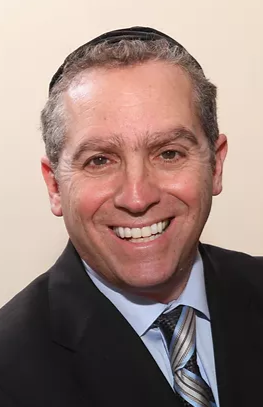
In last week’s Perashah we discussed many of the commandments between man and man; that is, between ourselves and others. This week’s Perashah is Terumah, and it describes the building of the Mishkan and the donations that are to be made towards this holy undertaking. The Perashah begins with the Pasuk, "Hashem spoke to Moshe, saying: Speak to the children of Israel and let them take for Me an offering (Terumah); from every person whose heart inspires him to generosity, you shall take My offering." Why is the opening sentence of this Perashah worded this way? Should it not read, Let B'nei Yisrael give Me a Terumah, rather than take for Me Terumah?
The answer is that when you give, you are actually getting more than what you are giving away, because when you give, as we discussed in last week’s Perashah, you will receive so much more in the way of Berachot from Hashem! Rabbi Diamond always taught us that just as we salt food in order to preserve it and keep it fresh, so too the way for us to protect our money and preserve it, is to give it away to charitable causes. I heard Ralph Tawil A'h speak many times about his personal experiences of how he kept giving tzedakah and how Hashem continued to bless him with more parnasah! Mr. Tawil continued to say "I keep trying to test Hashem but He keeps giving me more!" I heard his words as a formula for success! Hashem says it clearly in parashat Re'eh (14:22) "Asher Te'asher" give 10% and I will make you rich! The Pasuk then uses the phrase, "every man whose heart inspires him to generosity." What does this mean? We all are aware that when you give to a worthy cause, you have to give with your heart. I know from my own personal experiences that whenever my heart became motivated to give because of a heartwarming speech or a sincere personal encounter, I would give much more and I would give it with Simhah! Many times the speech brings me to tears. I remember clearly going from Shul to Shul during the summer Sephardic Bikur Holim fund-raising drives and how Joseph Beyda A"H spoke to the people. I would watch how his eyes would tear up as he spoke from the heart about personal encounters that he experienced with some of the clients he dealt with on a daily basis. I learned from him how to speak that way, by telling stories of clients of SBH that I had became involved with, so that I would also be able to motivate the hearts of the people I was addressing.
There is a famous story about brothers Nathan and Isadore Straus, who built a retail empire at the end of the 1800s which included Macy’s and Abraham & Straus department stores. In 1912, they both took a trip with their wives to pre-state Israel. Nathan and his wife Lina saw the poverty there and established soup kitchens and other charitable institutions. Isadore and Ida returned to the States on the luxurious Titanic, where they lost their lives heroically, with Isadore refusing to take the place of women in the lifeboats, and Ida refusing to leave her husband, and urging her maid to take her place. Nathan and Lina stayed behind to help the needy, leaving their berths on the Titanic empty. Because they were saved from that tragic disaster, Nathan saw this as a sign from above, and the couple devoted the rest of their lives to contributing to many charitable causes in Israel. They opened a school and a health clinic and offered one of the first major gifts to Hadassah Hospital. Over their lifetime they gave away two-thirds of their fortune to many charitable institutions. In 1927 the city of Netanyah was named after Nathan Straus, and Straus street in Yerushalayim is also named after the couple. We learn from this story how true is the famous phrase from the gemarah in Baba Batra (10a) "Tzedakah Tatzil Mimavet"...Charity Saves a person from Death!"
A few Pesukim later (25:8), Hashem says,Ve’asu li mikdash ve’shachanti betocham."They shall make a sanctuary for Me so that I shall dwell among them..." Grammatically, we would expect the Pasuk to say, “I will dwell in it.” Instead, the Torah uses the word betocham, "among them" or “in their midst.” Hashem chose the Jewish people as his nation, and He is saying that He wants to rest the Shechinah among us always. Today, we don't have the Mishkan or the Bet Hamikdash, but we do have our Synagogues, our homes, and our hearts, where we want Hashem's spirit to reside always. So, when possible, we must build our Synagogues with all the finest material, as the Pasuk instructs: "With gold and silver and copper [and so on]." But most importantly, we must keep the decorum of our Shul at the highest level, because we are there for just one purpose, and that is to pray and speak to Hashem, our Father in Heaven, with Kavanah (Concentration) and Devotion!
This can sometimes become a difficult task, because many of us like to socialize with our friends in Shul. Yet it is important to refrain from socializing during Tefilah or the Sefer Torah reading. I remember learning an important lesson about twelve years ago, when I was traveling to Israel with Rabbi Ozeri. He had a mini Mishnah Berurah with him. We began to study on the long flight; he opened it up to the very spot where the laws of Tefilah appear, specifically the part about the severity of the injunction against talking during Hazarah (the repetition of the Amidah). I knew that I was guilty of talking at that time, so I listened intently and decided at that moment to become more aware and hold back from speaking during Hazarah. l understood then how important the Halachah is, for it helps us keep and maintain the sanctity of our Shuls.
In Pesukim 10 and 11, the Torah describes in detail the building of the Mishkan using acacia wood: “two and a half cubits its length; a cubit and a half its width; and a cubit and a half its height. You shall cover it with pure gold, from within and from without you shall cover it, and you shall make on it a gold crown all around.”The phrase used, "from within and from without", according to Rabenu Hananel, symbolizes the Talmudic dictum that a Talmid Hacham must be consistent, because his inner character must match his public demeanor. His actions must conform to his professed beliefs. We also learn from the dimensions that are in half-measurements, that there is no end to Torah learning. Hacham Ovadia, Rav Moshe Feinstein and all the great Rabbis of the previous generations, and up to the present day, continued their learning right up to their last breath. The Bet Halevi derives from the reference to the inner and outer coating of gold that the community should feel a responsibility to provide an adequate livelihood to its teachers of Torah. They should be prosperous inside their own homes, as well as in their services to the public.
May we all be motivated in our hearts to give as much as we can to worthy causes, for altruistic reasons and not in order to gain honor from our peers. And may we all maintain our Synagogues with the highest level of decorum and Kedusha so that we may be worthy of having the Shechinah rest among us always. Amen!
Parasha perspective By Jack E. Rahmey from the teachings and guidance of Rabbi Amram Sananes.








